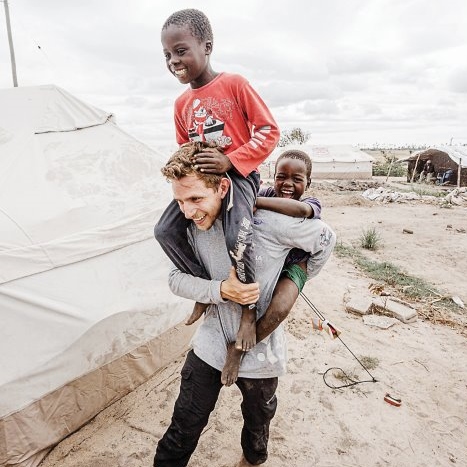
News

Small steps to sanity: life in Mozambique after cyclone
YANIR GRINDLER
The storm battered Mozambique, Malawi, Zimbabwe, and Madagascar, killing hundreds and displacing hundreds of thousands.
Last week, I travelled to Mozambique with five others as part of a team brought together by Cadena, a Jewish-headed humanitarian aid organisation founded in 2005.
We found that Beira – three months later – is slowly returning to normal. It has become the hub for co-ordination of Mozambican aid efforts. Thousands, however, are still forced to find refuge in the city’s makeshift relief camps, set up by the government and run by humanitarian groups.
Our mission was to restore dignity to the victims of the cyclones. With the generous support of the Ramson Cross Foundation and Dis-Chem in Norwood Mall, we transported 18 duffel bags full of goods to deliver to those in need. These included hygiene kits to prevent the spread of bacterial disease, reusable “subz” (sanitary pads and panties), drinking water filters to contain the outbreak of cholera, and inflatable solar lamps to compensate for the loss of electricity.
Beira had infrastructural challenges before it was hit by Idai, including poorly maintained public buildings and roads dotted with potholes. The storm drastically worsened these problems.
Travelling around Beira to reach the relief camps thus turned out to be a major challenge. Our first stop in Mozambique was in the storm-hit district of Buzi, located a few hours southwest of Beira.
On the outskirts of the village, a temporary relief camp had been set up, a desolate ground about the size of four soccer fields scattered with UNHCR (United Nations High Commissioner for Refugees) tents, each packing in more than 15 people.
In spite of the devastation, we were uplifted by the villagers, who showed a zest for life even in dire circumstances.
We were welcomed with spontaneous song and dance, and offered assistance at all times during our stay. “I’m just happy to be alive,” a 20-year-old man who identified himself as Reuben told me. He volunteered to be one of our translators. In broken English, he told me that in spite of losing his parents to the cyclone, he was confident that he would be able to find a job when things returned to normal.
It was a real whirlwind of emotions engaging with these special people. We spent the next two days allocating drinking water filters, solar lamps, and hygiene kits.
Located in Sofala province, Beira is the commercial nerve centre of Mozambique’s central region. However, it is seen as a stronghold of the opposition Renamo party, prompting claims that it has been deliberately neglected by the ruling Frelimo party.
Reuben told me that if it was not for the humanitarian organisations that quickly came to their rescue, many more would have died. Reflecting at the end of each day, however, it felt a bit like we were only sticking band aids over the pain.
What would happen after we left, when the water filters we had provided stopped working, when the temporary tents were taken down? Who would assist then?
On our last day in Beira, we ventured inland to spend some time with children orphaned by the cyclones. Miguel runs an orphanage that was partially destroyed by the storm.
“Before the storm, we housed 21 children, now we house more than 60.” he told us. As we distributed hygiene kits and water filters to Miguel and his colleagues, we couldn’t help but notice the sadness in the eyes of the children aimlessly passing the time in their makeshift playground.
We spent time trying to lift their spirits, playing, singing, and dancing with them, giving them temporary solace, but we struggled to hold back our emotions when we left. These children had been physically and emotionally neglected for so long, and as we drove off waving goodbye, it felt like we were simply adding to their pain.
Life has changed completely in Beira and its surrounding areas, but it goes on, and people are resilient. Everywhere we went, they were doing everything they could to rebuild their lives, however small the step.
Women strapped their babies to their bodies with brightly-coloured cloth, and continued to get water from wells or cook over small fires, slowly sifting porridge into boiling water to feed their families.
The young children, though, really stole my heart. The world’s true optimists , they found excitement in almost anything, sifting through piles of rubble, and making toys out of the debris – pieces of plastic, twigs, smashed CDs, and bottle tops.
Out of the devastation left by Idai, they found treasure. I went to Mozambique to give to these people, never thinking that I would receive so much in return. We have a lot to learn.
Cadena has recently launched a chapter in South Africa, and is encouraging people to get involved. More information can be found on its Facebook page “Cadena South Africa”, or by sending an email to the South African director at director.sa@cadena.ngo
- Yanir Grindler is political liaison at the SA Jewish Board of Deputies




